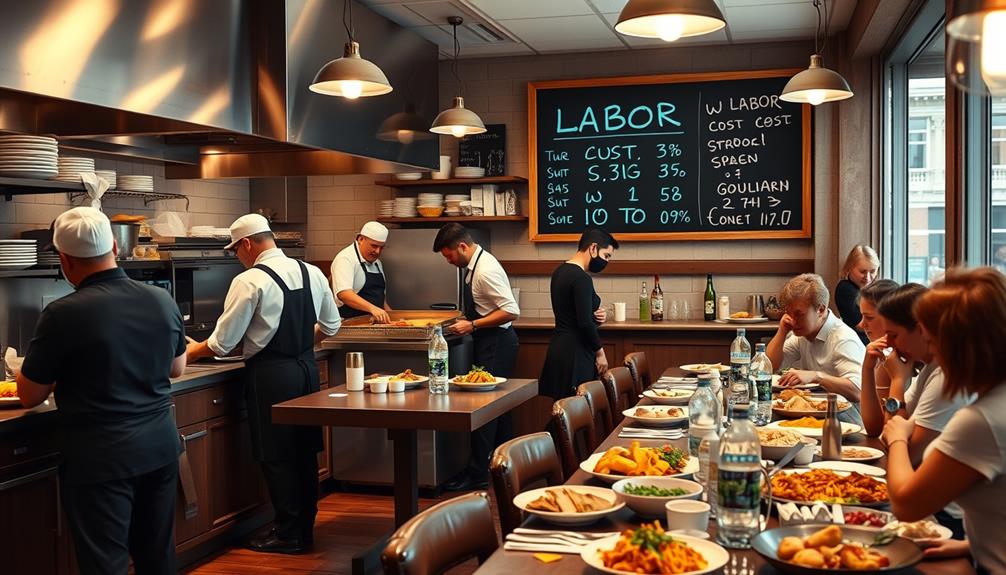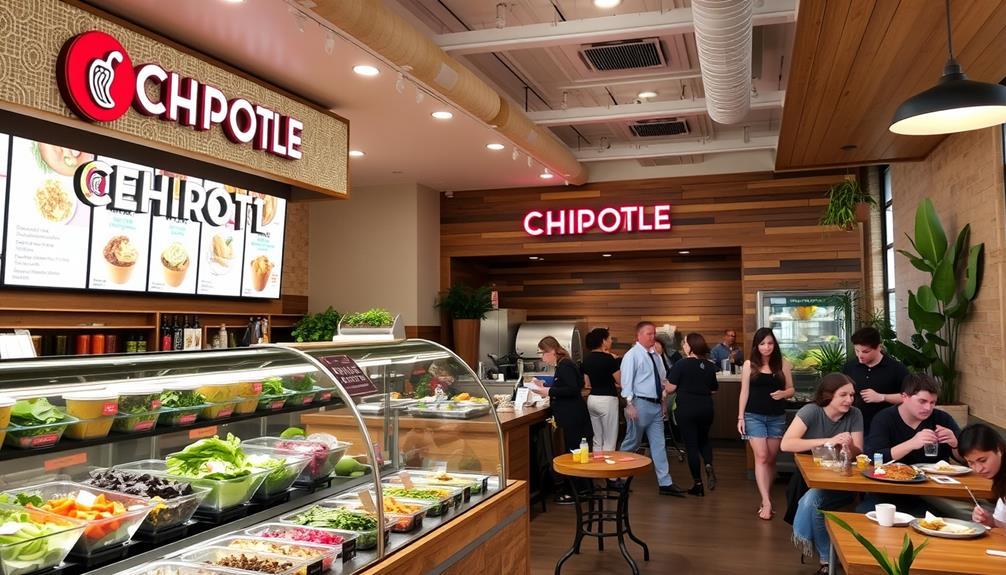As a restaurant owner, you could make anywhere from $24,000 to over $200,000 a year. Your earnings largely depend on your location, type of establishment, and how well you manage operations. For instance, upscale restaurants often pull in high profits, especially in urban areas. Cities like Pasadena average around $102,169, while multi-unit operators can exceed $200,000. Factors like experience and local consumer demand play a role too. Understanding these elements can help you enhance your income potential. If you want to explore more about what affects restaurant owner salaries, there's plenty more to discover.
Key Takeaways
- Average restaurant owner salary in Texas is approximately $87,521 annually, with a range from $17,149 to $292,850.
- Upscale restaurants can earn over $150,000 annually, while small independent restaurants typically earn between $29,000 and $60,000.
- Location significantly impacts earnings, with cities like Pasadena offering the highest average salary at $102,169.
- Multi-unit operators or franchise owners often exceed $200,000 annually due to economies of scale.
- Salary variability can reach up to $47,929 based on experience, location, and market demand.
Average Restaurant Owner Salary
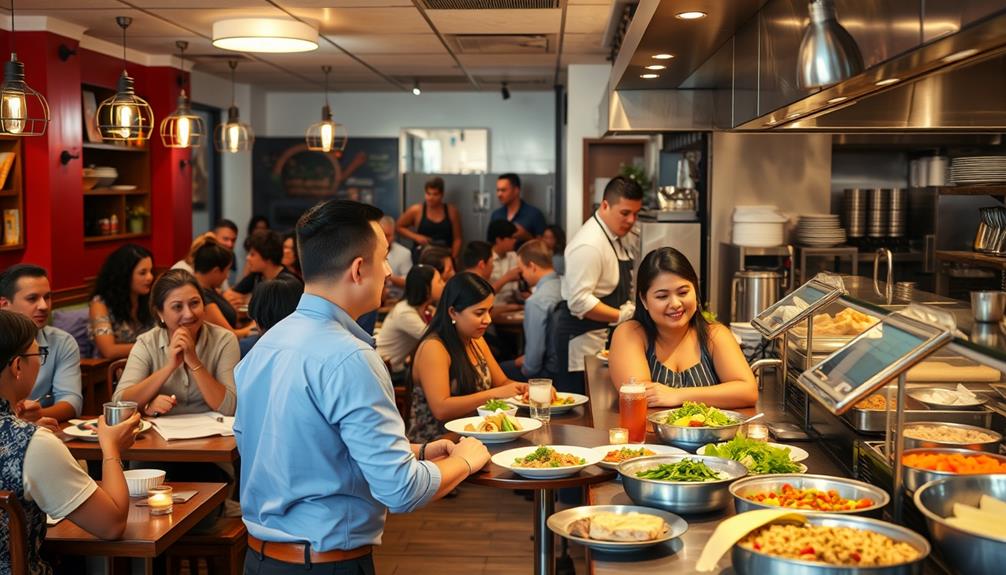
How much can you expect to earn as a restaurant owner? The average salary for restaurant owners varies widely, but in Texas, it's about $87,521 annually, or roughly $42.08 per hour. This figure represents a good benchmark, but don't be surprised to see restaurant owners' salaries range from as low as $17,149 to as high as $292,850.
Your earnings will largely depend on factors like your experience, the type of restaurant you own, and the market conditions in your area. Additionally, understanding the importance of a solid budget can help you manage your restaurant's finances more effectively.
Across the U.S., the median annual pay for restaurant owners sits at around $58,193, with many earning between $45,500 and $100,000. If you run an upscale establishment, you could easily earn over $150,000. Additionally, the amount of profit a restaurant owner brings in can also depend on various factors such as the location, size, and concept of the restaurant. However, it’s important to note that along with the potential for high earnings, running a restaurant also comes with significant expenses, including the cost of restaurant insurance. This is an essential investment to protect the business from potential liabilities, such as customer injuries, property damage, and other unexpected incidents. Therefore, it’s crucial for restaurant owners to budget for these expenses in order to ensure the success and longevity of their business.
Multi-unit operators or franchise owners have the potential to bring in more than $200,000 annually. Keep in mind that seasonal business cycles and restaurant profitability greatly impact your monthly income, leading to fluctuations in your overall pay throughout the year.
Salary Variation by Location
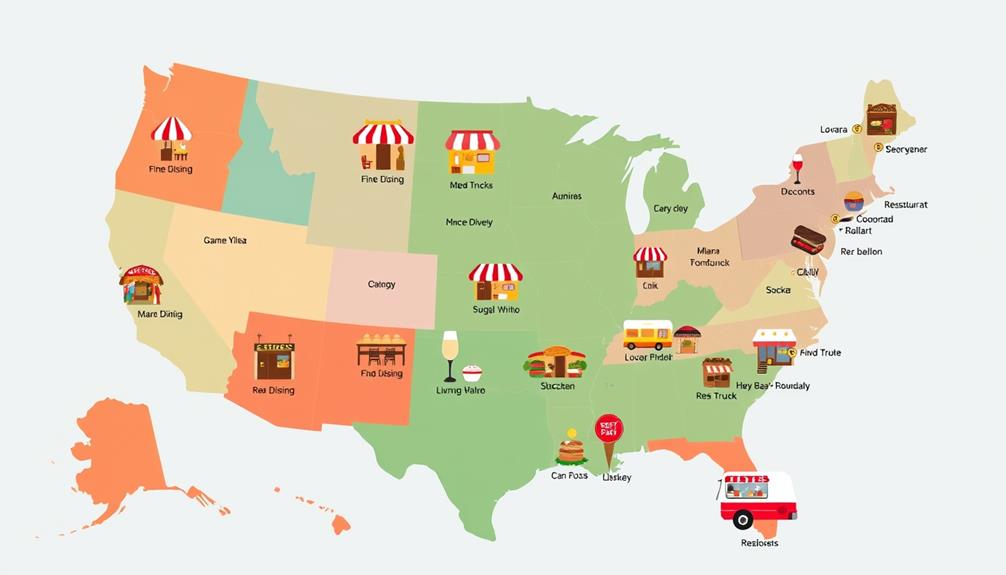
Restaurant owner salaries can fluctuate considerably based on location. In Texas, for example, the average annual salary is $87,521, but you might find yourself earning anywhere from $17,149 to $292,850. This wide range is influenced by factors such as experience and, importantly, your specific location within the state.
Factors such as local economy and consumer spending can also impact restaurant profitability, similar to how cold medications vary by type based on the symptoms they address.
Cities like Pasadena, Pearland, and Mesquite offer higher salary figures, with averages of $102,169, $99,810, and $99,757 respectively, markedly above the state average. These urban centers attract more customers, which can lead to increased profits for restaurant owners.
However, Texas ranks 25th in the U.S. for restaurant owner salaries, suggesting that, on average, you might earn less compared to your counterparts in other states.
Geographic factors play a essential role in salary variability, with urban environments typically yielding higher profits. You can experience a salary variation of up to $47,929 based on your experience level, the specific location of your restaurant, and its type.
Understanding these nuances can help you make informed decisions about where to establish your restaurant for maximum earnings.
Highest Paying States

When considering where to open your restaurant, you'll want to know which states offer the highest salaries for owners.
Washington tops the list with an impressive average of $99,811, while other states like New Jersey and California also provide competitive earnings.
Additionally, understanding the importance of diversification of retirement portfolio can further enhance your financial planning as a restaurant owner.
Understanding these salary comparisons can help you make an informed decision about your next business venture.
Top Earning States
Across the United States, certain states stand out as lucrative places for restaurant owners to thrive. Understanding the legal process of divorce can be particularly essential for those in the restaurant industry who may face personal challenges that impact their business.
If you're considering where to set up shop, the top-paying states can greatly influence your earnings. In Washington, restaurant owners earn the highest average annual salary of $99,811, making it a prime location for success. New Jersey closely follows, offering an average annual income of $90,806 for restaurant owners.
New York ranks similarly, with restaurant owners earning about $90,983 each year, showcasing its bustling culinary scene. California isn't far behind, as restaurant owners earn an average of $89,291 annually, solidifying its position as one of the top-paying states.
Lastly, Florida rounds out the top five, with restaurant owners making an average annual salary of $85,479. These numbers highlight the potential for substantial earnings in these states, and if you're aiming for financial success in the restaurant industry, considering these top-paying states could be a smart move.
Salary Comparison by Location
Examining the earnings of restaurant owners reveals considerable disparities based on location, with some states offering remarkably higher salaries. If you're considering opening a restaurant, knowing where to set up shop can greatly influence your potential income.
Additionally, understanding the importance of diversifying your investments, such as through a Gold IRA, can contribute to your long-term financial stability and resilience in the industry diversify retirement portfolios.
Here are some of the highest-paying states for restaurant owners:
- Washington: Average income of $99,811 annually
- New York: Average Restaurant Owner salary of $90,983
- New Jersey: Average salary of $90,806
California and Florida also rank high, with average annual incomes of $89,291 and $85,479, respectively. These figures highlight how your earnings can vary considerably depending on where you choose to operate.
In Washington, for example, the average income for restaurant owners surpasses $99,000, making it the most lucrative state. On the other hand, if you're in New Jersey or New York, you'll still enjoy competitive salaries, but you mightn't reach the heights of Washington's figures.
Ultimately, understanding these salary comparisons can guide your decision-making process and help you maximize your earnings in the restaurant industry.
Top Cities for Earnings
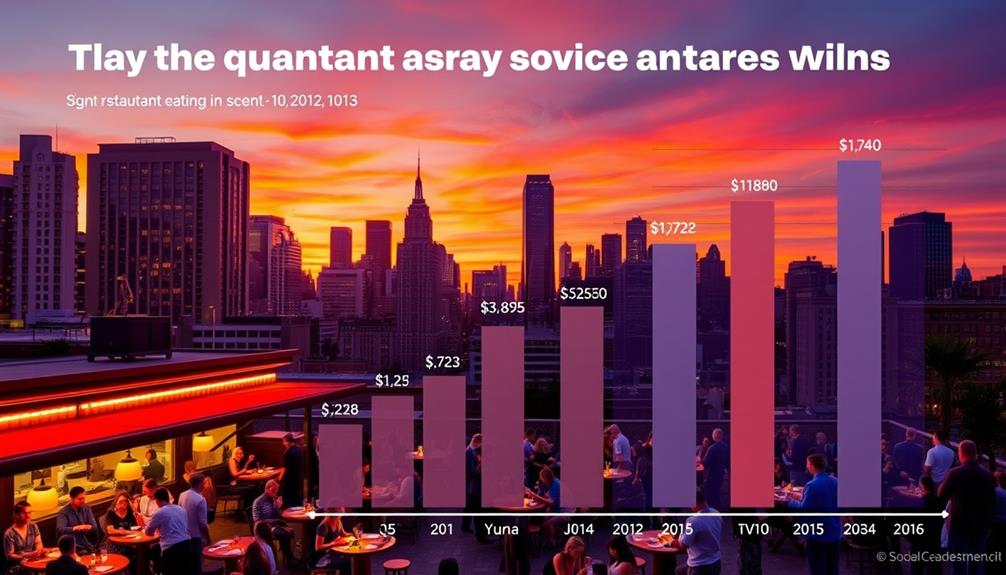
If you're considering where to open a restaurant in Texas, you'll want to know which cities offer the best earning potential for owners. Pasadena stands out as the top city for restaurant owners, boasting an impressive average annual salary of $102,169.
Following closely behind is Pearland, where restaurant owners can expect to earn about $99,810 annually. If you're looking at Mesquite, you'll find that restaurant owners there earn approximately $99,757 each year, making it another strong contender.
Additionally, understanding the financial considerations for running a restaurant, such as assisted living expenses, can provide valuable insight into the economic landscape in these cities.
Plano also ranks among the top-paying cities, with an average annual salary of $95,680 for restaurant owners. Finally, Houston rounds out this list, offering a respectable average annual salary of $91,317.
By focusing on these top-paying cities, you can strategically position your restaurant to maximize your earnings as an owner. Each of these locations provides a unique market and customer base, so consider what aligns best with your vision for your restaurant.
Whether you choose Pasadena, Pearland, Mesquite, Plano, or Houston, understanding these earning potentials will help you make a more informed decision about where to establish your business.
Factors Affecting Income
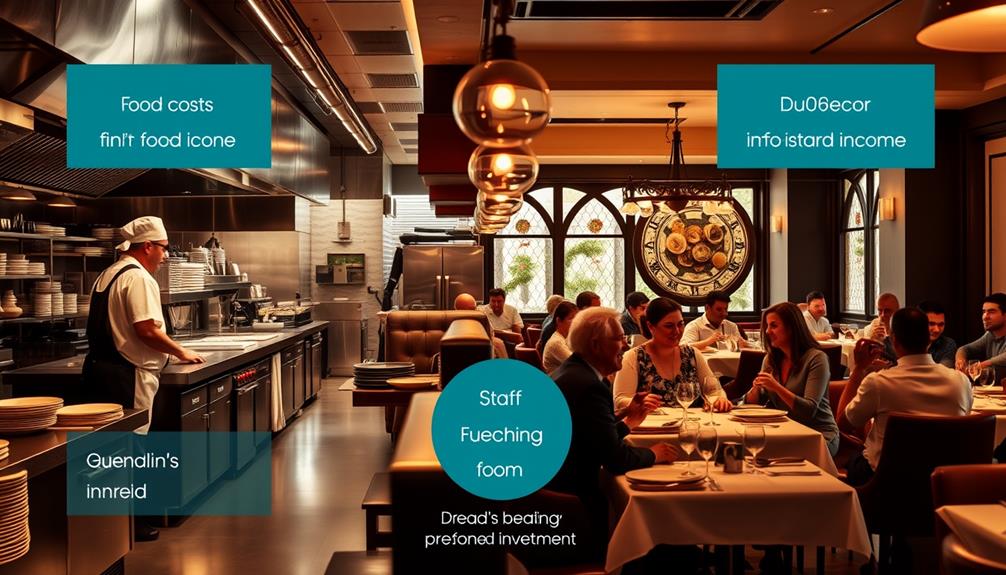
When it comes to your restaurant income, several factors can make a big difference.
Geographic location, the type of establishment you run, and how efficiently you manage operations all play essential roles in determining your earnings.
Additionally, employing data-driven strategies can yield measurable results that enhance profitability.
Understanding these elements can help you maximize your potential income and navigate the challenges of the industry.
Geographic Location Impact
Geographic location plays an essential role in determining restaurant owners' income, with considerable variations across the United States. For instance, Texas ranks 25th in average annual salary for restaurant owners at $87,521.
However, cities within states can differ widely; Pasadena, Texas, boasts the highest average salary at $102,169, showcasing how urban demand and cost of living notably impact earnings. Additionally, factors such as free crypto opportunities can influence income levels in regions where technology and finance intersect with the restaurant industry.
Several factors contribute to these income disparities:
- State Economic Conditions: High-paying states like Washington and New Jersey offer average annual salaries of $99,811 and $90,806, respectively.
- Market Saturation: Areas with more competition can drive down salaries, affecting overall income potential.
- Job Opportunities: Low hiring rates in certain Texas regions limit wage advancement for restaurant owners.
With a variability of up to $47,929 based on experience and location, it's clear that geographic location is vital in shaping the financial success of restaurant owners.
Business Type Variability
The type of restaurant you own can greatly influence your income, with notable differences in earnings across various establishments. If you operate an upscale restaurant, you might pull in an impressive $150,000 or more annually. In contrast, small independent restaurants generally see earnings between $29,000 and $60,000 per year.
Multi-unit operators and franchise owners typically have even higher earnings potential, often exceeding $200,000 annually due to economies of scale and brand recognition. Additionally, understanding your target audience and optimizing for relevant keywords can enhance your visibility and customer reach, ultimately affecting your revenue potential effective keyword research.
It's important to take into account the specific business type as well; coffee shops, bakeries, and nightclubs all have differing revenue potentials and operating costs. For instance, a nightclub may generate substantial income on weekends, while a bakery might depend on consistent daily sales.
Additionally, your location can impact profit margins considerably. Urban centers and tourist spots tend to yield higher profits compared to rural areas.
Ultimately, understanding the nuances of your business type is essential in setting realistic expectations for your earnings. By being aware of these factors, you can better strategize to maximize your annual income and improve your establishment's financial health.
Operational Efficiency Significance
Understanding the type of restaurant you operate sets the stage for maximizing your income, but operational efficiency plays a pivotal role in determining your actual earnings. With profit margins typically ranging from 3% to 5%, effective management can greatly impact your bottom line.
Additionally, incorporating unique offerings, such as specialty coffee beverages, can enhance your menu and attract more customers, which may lead to increased sales and profitability different brewing methods.
To enhance operational efficiency, consider focusing on the following factors:
- Smart Scheduling: Implementing better staff schedules reduces labor costs and minimizes employee turnover, which can be expensive.
- Inventory Management: Keeping track of inventory helps prevent waste and guarantees you always have what you need during peak times.
- Cost Control Measures: Regularly reviewing operational expenses like labor and overhead can greatly influence your salary and the overall financial health of your restaurant.
As a restaurant owner, it's crucial to recognize that the average revenue for new restaurants is around $500,000 in the first year.
Restaurant Profit Margins

Many restaurant owners find that profit margins are often tight, typically ranging from 3% to 5%. These margins greatly impact your salary and the overall profitability of your business model.
While successful restaurants can generate annual revenues exceeding $1 million, high overhead costs can drastically limit those profit margins.
As a restaurant owner, you might see your salary fluctuate widely, with estimates ranging from $24,000 to $155,000 annually, largely dependent on operational success. This variability can be influenced by factors like seasonal business cycles, which can lead to fluctuating monthly income and affect your financial stability.
To improve restaurant profit margins, effective financial management and cost control are essential. Streamlining operations and reducing waste can enhance both your profit margins and your income.
You need to closely monitor your expenses and find ways to maximize efficiency. Understanding these aspects of your business will help you navigate the challenges of the restaurant industry and potentially increase your earnings.
Financial Management Strategies

Maneuvering the financial landscape of your restaurant requires smart strategies that can help you keep your business afloat and thriving.
To guarantee your financial management is effective, consider these key strategies:
- Reinvest Profits: Aim to take less than 50% of your profits as salary. Focus on reinvesting in your business for growth and sustainability.
- Control Costs: With profit margins in the restaurant industry ranging from 3% to 5%, effective cost control and budgeting are essential for maintaining financial health.
- Plan for Fluctuations: Monthly income can vary due to seasonal cycles. Develop strategic financial planning and cash flow management to navigate slow periods effectively.
Job Market Overview

In Texas, the job market for restaurant owners can be tough, with low hiring rates making it harder for newcomers to break in.
You'll find that salary variability is significant, influenced by experience and where you're located.
Understanding these employment trends is essential for maneuvering your financial future in this industry.
Employment Trends in Texas
The restaurant ownership job market in Texas is challenging, with low hiring rates limiting opportunities for wage growth in various cities. If you're considering entering this field, it's important to know that Texas ranks 25th in the U.S. for restaurant owner salaries, with an average annual salary of $87,521.
Here are some key points to keep in mind:
- High-paying cities like Pasadena, Pearland, and Mesquite offer average salaries ranging from $99,757 to $102,169.
- Salary variability can reach up to $47,929, depending on your experience and location.
- Job postings on platforms like ZipRecruiter provide a glimpse into the competitive and fluctuating nature of the market.
Navigating the job market for restaurant owners in Texas requires awareness of these trends. While the average annual salary might seem appealing, the realities of low hiring rates can impact your career growth.
Salary Variability Factors
Salary variability for restaurant owners in Texas hinges on several key factors, including experience, location, and market demand. The average annual salary for restaurant owners in Texas is around $87,521, but you might find yourself earning anywhere from $17,149 to $292,850 based on these variables.
Your experience level plays a significant role in determining your salary. More seasoned owners typically command higher wages, while those just starting out may earn near the lower end of the spectrum.
Location matters, too; cities like Pasadena and Pearland boast higher salaries at $102,169 and $99,810 annually, respectively. In contrast, other areas may offer limited opportunities for wage advancement, which can stifle your overall earning potential.
Additionally, Texas ranks 25th in the U.S. for restaurant owner salaries, indicating a competitive job market with relatively low hiring rates. This means that while the salary variability can be substantial—up to $47,929—finding the right city and leveraging your experience will be essential for maximizing your annual salary as a restaurant owner in Texas.
Responsibilities of Restaurant Owners
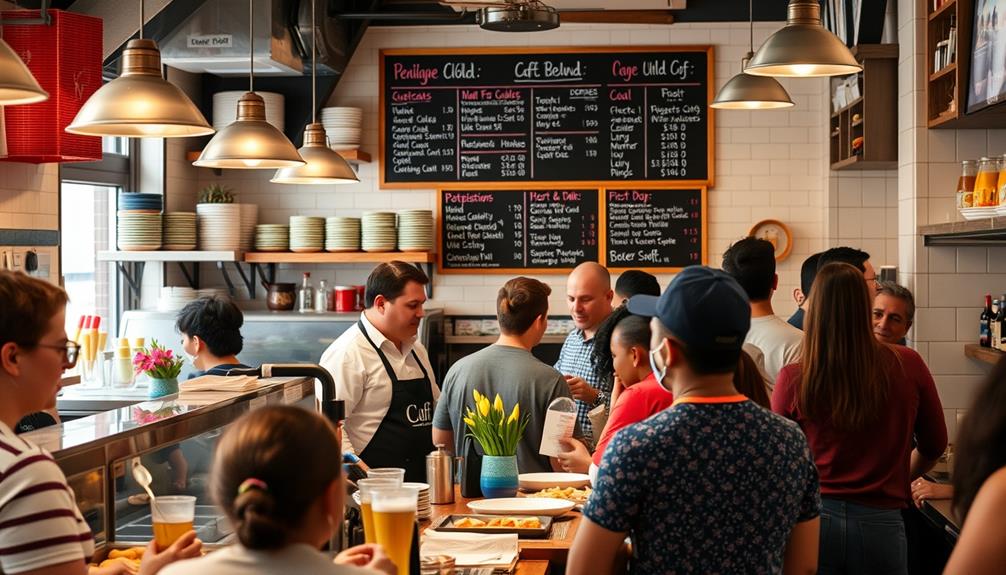
Running a restaurant comes with a diverse set of responsibilities that can make or break your establishment. As a restaurant owner, you need to wear many hats and guarantee every aspect of your business runs smoothly. Here are some key responsibilities you'll handle:
- Concept Creation: You'll decide on the name, theme, cuisine, and menu planning to attract customers.
- Staff Management: Hiring and supervising staff is essential for delivering quality service. This includes conducting interviews and providing training.
- Financial Management: Tracking expenses, budgeting, and guaranteeing profitability are critical to keep your restaurant afloat.
Additionally, you'll coordinate with suppliers to maintain a consistent ingredient supply, which is important for operational efficiency.
Marketing initiatives, like promotions and advertising strategies, are also your responsibility; they play a significant role in attracting and retaining customers.
Balancing these responsibilities can be challenging, but they're integral to your success as a restaurant owner. By mastering these elements, you'll lay the groundwork for a thriving establishment that meets both customer expectations and financial goals.
Benefits and Challenges of Ownership

Owning a restaurant offers a unique blend of rewards and challenges that can shape your experience as an entrepreneur. On one hand, you'll enjoy creative freedom in menu development and interior design, allowing you to express your culinary passion and vision. You also play a significant role in your community by enhancing cultural engagement and providing jobs, fostering a sense of belonging.
However, the benefits and challenges of ownership are substantial. High initial capital investment and competitive market dynamics demand that you craft a unique value proposition to attract and retain customers, making it essential to stay innovative.
Labor shortages further complicate matters, impacting service quality and operational efficiency. Finding and maintaining staff who share your vision is an ongoing challenge that can directly affect your customers' experiences.
Additionally, compliance with health, safety, and employment regulations requires constant attention. This complexity adds to your responsibilities and can be overwhelming.
While many restaurant owners make a decent profit, the journey involves maneuvering through these hurdles. Understanding both the benefits and challenges of ownership is imperative for running a successful restaurant that thrives in today's competitive landscape.
Frequently Asked Questions
Do Restaurant Owners Make Good Money?
You might find that restaurant owners can make good money, but it varies widely based on factors like location and experience. Upscale places can yield higher profits, while startups often see lower initial earnings.
How Much Would I Make if I Owned a Restaurant?
If you owned a restaurant, you'd probably be laughing all the way to the bank—until you realize the bank's empty! Your earnings could range widely, influenced by location, experience, and sheer luck.
Can You Become a Millionaire Owning a Restaurant?
Yes, you can become a millionaire owning a restaurant, but it usually requires multiple successful locations or a high-revenue establishment. Effective management, cost control, and innovative strategies are essential for maximizing profitability and wealth accumulation.
How Profitable Is Running a Restaurant?
Did you know that the average restaurant profit margin hovers around 3% to 5%? Running a restaurant can be tough; you'll need to manage expenses wisely and adapt to seasonal sales fluctuations for profitability.
Conclusion
In summary, while it might seem intimidating to become a restaurant owner due to the variable income, remember that many factors can boost your earnings. By managing finances wisely and choosing the right location, you can greatly increase your profits. Picture a thriving eatery, filled with satisfied customers, and imagine the financial rewards that come with successful ownership. With dedication and the right strategies, you can turn your passion for food into a lucrative venture.


